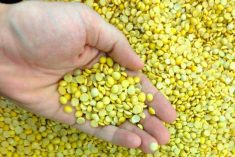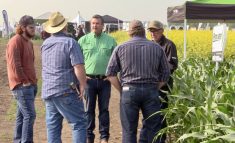A new Agriculture and Agri-food Canada (AAFC) report shows farmers remain concerned about federal emissions reduction targets — and whether those targets remain voluntary.
The “What We Heard” Report, released Wednesday, is the result of consultations between AAFC and the agricultural sector to gather feedback on how best to support farmers and producers to achieve a 30 per cent reduction in fertilizer-related greenhouse gas (GHG) emissions from agriculture by 2030 — a stated federal goal since 2020.
Over 2,000 submissions were received through the online consultation, technical workshops, and town hall meetings between March and October 2022. Farmers, producers, industry associations, provinces and territories, scientists and environmental organizations provided their input.
Read Also

Canola industry pumped about 45Z clean fuel ruling in U.S.
Canada’s canola sector is pleased with the new 45Z guidance published by U.S. Treasury.
A large number of respondents questioned whether a fertilizer emissions reduction target was needed, a sentiment that was often coupled with concerns that a mandatory target might later be imposed. A significant number of respondents said they preferred an intensity-based reduction in emissions rather than an absolute reduction in emissions. They were also concerned about how these targets might impact production.
Farmers were also concerned that climate change policies might not take into consideration the economics of emission reductions and how that could affect their bottom line.
Another concern was that applying blanket policies doesn’t properly reflect the regional diversity of the agriculture sector in Canada. Respondents indicated more localized data and increased extension services would help them adopt nitrogen management practices.
However, while there were many concerns with the program, there was also significant buy-in. Many respondents recognized the need to act on climate change and were on board with reducing emissions. But they also wanted recognition for the role that Canadian farmers already play in promoting sustainability and reducing emissions, something in which many respondents felt pride.
“Fertilizers are an essential input for farmers,” Agriculture Minister Marie-Claude Bibeau said in the report. “We need to ensure that our efforts to reduce emissions do not undermine their competitiveness or their vital work, especially at a time when food insecurity has reached unprecedented levels worldwide and the fertilizer supply chain is increasingly strained.”
Bibeau’s message also reinforced the voluntary nature of the targets.
“I would like to be clear; there is no mandatory reduction in fertilizer use on Canadian farms. Instead, we want to support measures that producers can take voluntarily to reduce their emissions over the long term without curtailing growth in crop yields,” she said.
The desire to see better communication and engagement between the government and the agricultural sector also emerged through the consultation process. To address this, a Fertilizer Working Group is being formed under the Sustainable Agriculture Strategy Advisory Committee.
The objectives of the committee will be to strengthen the ongoing dialogue between industry and government, examine mechanisms that need further support and improve the measurement and tracking of fertilizer emissions reductions in the sector.
“There is clearly a diversity of perspectives on many key issues, and we are pleased to see the report identify the importance of further producer engagement in advancing this voluntary approach,” said Keith Currie, president of the Canadian Federation of Agriculture. “We are pleased to see the report factor in producer profitability.”
Fertilizer Canada CEO Karen Proud said she was pleased to see the support of 4R nutrient stewardship. “We look forward to continuing to work with the government and producers to improve measurement and accelerate the adoption of 4R best management practices, which reduce emissions and increase productivity,” she said.
— Don Norman reports for the Manitoba Co-operator from Winnipeg.
















